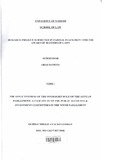| dc.contributor.author | Ochilo, Mbogo A G | |
| dc.date.accessioned | 2013-04-16T11:51:32Z | |
| dc.date.issued | 2010 | |
| dc.identifier.citation | LLM Thesis | en |
| dc.identifier.uri | http://erepository.uonbi.ac.ke:8080/xmlui/handle/123456789/16148 | |
| dc.description.abstract | Kenya is a nascent multiparty democracy having returned to political pluralism only seventeen
years ago. She is a former British colony and at her independence assumed most of British laws
with little modification. She holds General Elections every five years to elect her political
leaders- civic, parliamentary and presidential. These leaders serve for a term of five years unless
elections are called earlier. The last General Election, which was the tenth since Kenya's
independence from the British, took place in 2007. This study is in respect of the Parliament
which was the result of the ninth General Election held in 2002. The Kenyan National Assembly
is made up of two hundred and twenty four Members. I Two hundred and ten Members, including
the President, represent parliamentary constituencies and twelve nominated members represent
special interest.' The other two are the Speaker and the Attorney General, who are ex-officio
members. | en |
| dc.description.sponsorship | University of Nairobi | en |
| dc.language.iso | en | en |
| dc.publisher | University of Nairobi | en |
| dc.subject | The effectiveness of the oversight role of the kenyan parliament: a case study of the public accounts & investment committees in the ninth parliament | en |
| dc.title | The effectiveness of the oversight role of the Kenyan parliament: a case study of the public accounts & investment committees in the ninth parliament | en |
| dc.type | Thesis | en |
| local.publisher | School of law | en |

